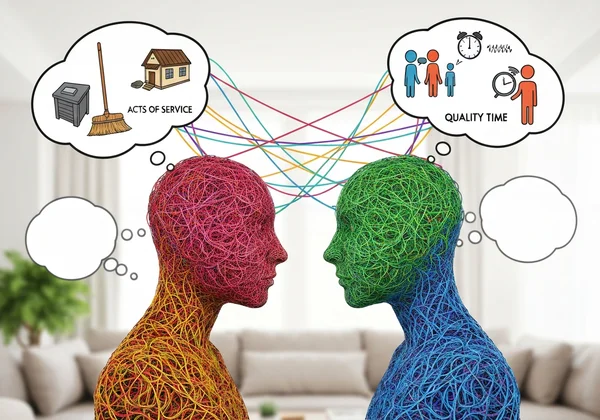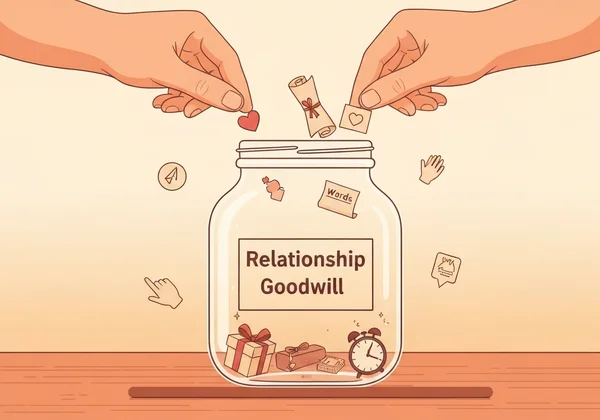اختبار لغات الحب للأزواج: حل النزاعات وبناء روابط أقوى
November 20, 2025 | By Hannah Carter
هل تستنزفك المشاجرات المستمرة في علاقتك؟ في لحظة تتحدثون عن خطط العشاء، وفي اللحظة التالية تشتبكون في معركة حول من يقوم بالمزيد من الأعمال المنزلية. إنه أمر مرهق ومحبط. كمتحمس لعلم النفس، لاحظت عددًا لا يحصى من الأزواج يقعون في هذا الفخ، ليس بسبب نقص الحب، ولكن بسبب نقص الفهم. تكمن المشكلة غالبًا في خلافات لغات الحب، حيث تحاولان التعبير عن المشاعر، لكن رسائلكما لا تصل بالطريقة الصحيحة. لكن ما هي لغات الحب الخمس؟ وكيف يمكن لاستنتاجات اختبار لغة الحب أن تكون سلاحك السري لحل النزاعات؟
سيرشدك هذا الدليل إلى كيف يمكن لفهم هذا الإطار القوي أن يحول خلافاتك إلى فرص لبناء اتصال أعمق وأكثر متانة. حان الوقت للتوقف عن الجدال والبدء في الفهم. الخطوة الأولى لسد هذه الفجوة هي اكتشف/اكتشفي لغة حبك.

فهم النزاع من خلال لغات الحب
النزاع جزء طبيعي من أي علاقة. لكن الخلافات المتكررة تنبع غالبًا من مصدر أعمق: الشعور بعدم الاستماع، أو عدم التقدير، أو عدم الشعور بالحب. تقدم نظرية لغات الحب الخمس التي طورها الدكتور غاري تشابمان عدسة قوية للنظر إلى لحظات الاحتكاك هذه. اللغات الخمس هي: كلمات التقدير، الوقت النوعي، تلقي الهدايا، التعبير عن الحب عبر الخدمات، والتلامس الجسدي. عندما لا نتحدث لغة شريكنا الأساسية، حتى أفضل نوايانا قد تفشل في إيصال الرسالة الصحيحة.
لماذا تحدث المشاجرات: تعبيرات حب خاطئة الفهم
كثير من الخلافات تشتعل بسبب ما أسميه "تشابك في تعبيرات الحب". تخيل شريكًا لغته الأساسية في الحب هي التعبير عن الحب عبر الخدمات. يقضي يوم السبت في تنظيف المنزل بأكمله، معتقدًا أن هذه البادرة تعني "أنا أحبك وأهتم بك". لكن شريكه الذي لغته الوقت النوعي يشعر بالإهمال والوحدة لأنهما قضيا اليوم منفصلين. في ذلك المساء، يعلق شريك لغة الوقت النوعي: "نحن لا نقضي أي وقت معًا"، ما يجعل شريك التعبير عن الحب عبر الخدمات مرتبكًا وغير مقدر. هذا هو جوهر الحب الخاطئ الفهم. النزاع ليس حول المنزل النظيف؛ بل حول الاحتياجات العاطفية غير الملباة. إن إدراك هذه الأنماط هو الخطوة الأولى لحلّها.

تحديد لغة حب شريكك في لحظات التوتر
خلال فترات التوتر، تزداد حاجتنا لتلقي الحب بلغتنا الأساسية. لتحديد لغة حب شريكك، انتبه جيدًا لأمرين: ما يشكو منه غالبًا، وكيف يعبر عن حبه لك بشكل طبيعي. إن كان شريكك يقول بشكل متكرر: "أنت لم تمدحني مؤخرًا"، فغالبًا لغته هي كلمات التقدير. إن كان دائمًا ما يبدأ بعناقك أو مسك يدك، خاصة بعد يوم صعب، فهو يعبر غالبًا عبر التلامس الجسدي. هذه اللحظات العصيبة هي نوافذ إلى أعمق احتياجاته العاطفية. لمزيد من الفهم، شجعه على خوض اختبار لغة الحب المجاني أو استبيان لغات الحب الخمس السريع معك.
استراتيجيات استباقية لتواصل صحي
أفضل طريقة لحل النزاع هي منع تصاعده من الأساس. بناء أساس من التفاهم والتقدير يُشكّل حاجزًا قويًا ضد الخلافات. يتضمن ذلك التحدث بلغة حب شريكك باستباقية وتبني تمارين تواصل صحي كممارسة يومية.
التحدث بلغة حبهم قبل نشوب النزاع
تخيل علاقتك كحساب بنكي عاطفي. كل مرة تتحدث فيها بلغة حب شريكك، تودع مبلغًا فيه. رصيد صحي يوفر أمانًا عاطفيًا يُمكنك الاستفادة منه في الأوقات الصعبة، كالخلافات. لمنع المشاجرات، اجعل ودائعك صغيرة ومستمرة:
- كلمات التقدير: أرسل رسالة خلال اليوم تقول: "أنا فخور جدًا بك".
- الوقت النوعي: أبعد هاتفك لمدة 20 دقيقة بعد العمل للتحدث دون تشتيت.
- تلقي الهدايا: أحضر وجبته الخفيفة المفضلة كبادرة "كنت أفكر فيك".
- التعبير عن الحب عبر الخدمات: تخلص من مهمة في قائمته دون أن يطلب.
- التلامس الجسدي: اعطه عناقًا طويلًا قبل مغادرتكما في الصباح.
هذه التصرفات الصغيرة تبني مخزونًا من المشاعر الإيجابية والحب يقوي رابطكما.

الإنصات الفعال والتأكيد: أكثر من مجرد سماع
من أقوى أدوات التواصل هو الإنصات الفعال. وهذا يتجاوز مجرد انتظار دورك في الكلام. تتضمن أساليب الإنصات الفعال سماع ما يقوله شريكك حقًا، والاعتراف بمشاعره، وإظهار أنك تفهم وجهة نظره، حتّى لو لم توافق عليها.
عندما يتحدث شريكك، حاول:
- أعد الصياغة: "فهمت أنك شعرت بالأذى حين تأخرت".
- اعترف بمشاعره: "من المنطقي أن تشعر بهذه الطريقة".
- اطرح أسئلة: "هل يمكنك إخباري أكثر عن شعورك حينها؟"
هذا الأسلوب يُعد نوعًا من كلمات التقدير تجعل شريكك يشعر بالتقدير والاحترام، ما يخلق مساحة آمنة للحوار الصادق.
تهدئة الخلافات بالتعاطف
حتى مع أفضل الاستراتيجيات الاستباقية، ستحدث الخلافات. المفتاح هو إدارتها بشكل بنّاء. حين تشتعل المشاعر، يصبح قول أشياء تندم عليها سهلًا. تعلم كيفية تهدئة الموقف ضروري لمنع الأضرار الدائمة.
الرد لا التصرف: أخذ استراحة مثمرة
حين تشعر بالغضب، يدخل جسدك في وضعية "القتال أو الهروب". يغيب التفكير العقلاني، ويحل محله ردود الفعل الدفاعية. لـ تهدئة الخلافات، يجب أن تتعلم الرد بانتباه بدل التصرف بانفعال. أداة فعّالة لذلك هي الاستراحة. قل شيئًا مثل: "أشعر بالإرهاق الشديد لمناقشة هذا الآن بشكل منطقي، هل يمكننا أخذ 15 دقيقة لتهدئة ثم العودة؟". هذا ليس تجنبًا للمشكلة، بل خلق مساحة عاطفية لحوار محترم.
عبارات "أنا أشعر": التعبير عن الاحتياجات لا الاتهامات
عبارات الاتهام المباشرة ("أنت دائمًا..." أو "أنت أبدًا...") تضع شريكك في وضع الدفاع فورًا. طريقة أكثر فعالية للتعبير عن احتياجاتك هي استخدام عبارات "أنا أشعر". هذا الإطار يساعدك في امتلاك مشاعرك دون إلقاء اللوم.
الصيغة بسيطة: "أشعر [بالألم] حين [السلوك المحدد] لأن [تأثيره عليك]".
مثلاً، بدلًا من قول: "أنت لا تساعدني مع الأطفال"، قل: "أشعر بالإرهاق والوحدة حين أُدير روتين نوم الأطفال وحدي لأن الأمر أشبه بحمل أكبر من طاقتي". هذا الأسلوب يدعو للتعاطف والتعاون بدل الدفاع والهجوم المضاد.
الإصلاح وإعادة الاتصال بعد النزاع
كيفية عودتكما معًا بعد الشجار أمر بنفس أهمية طريقة تعاملكما مع الشجار نفسه. عملية الإصلاح هي حيث يُعاد بناء الثقة وتقوية الاتصال. تخصيص اعتذارك وإجراءاتك التالية وفقًا للغة حب شريكك يمكن أن يُحدث كل الفرق.
اعتذارات تصل للقلب: مطابقة اعتذارك للغة حبه
"أنا آسف" عامة قد لا تكفي. لتتعلم كيف تعتذر بفعالية، يجب أن تتحدث بلغته:
- كلمات التقدير: يحتاج سماع "أنا آسف" مع اعتراف بخطئك.
- الوقت النوعي: يحتاج اهتمامك الكامل لمناقشة ما حدث وإعادة التواصل.
- تلقي الهدايا: هدية مدروسة يمكن أن تكون رمزًا ملموسًا لاعتذارك والتزامك بالإصلاح.
- التعبير عن الحب عبر الخدمات: يحتاج رؤيتك تتحرك لإصلاح المشكلة أو تخفيف عبئه. "آسف على الفوضى، دعني أنظفه".
- التلامس الجسدي: عناق صادق أو احتواء يمكن أن ينقل الندم والطمأنينة أقوى من الكلمات.
إعادة بناء الثقة: أفعال مستمرة بلغة حبه
لا تُعاد الثقة باعتذار واحد؛ بل بأفعال جديرة بالثقة بمرور الوقت. بعد نزاع، ابذل جهدًا واعيًا لـ بناء الثقة بعد الشجار عبر التحدث بلغة حب شريكك بانتظام. هذا يظهر التزامك بالسعادة ورفاهيته. إن كانت لغته التعبير عن الحب عبر الخدمات، نفذ وعودك باستمرار. إن كانت الوقت النوعي، احمِ وقتكما المخطط بصرامة. الأفعال الدائمة تثبت أن اعتذارك كان أكثر من كلماتٍ - كان وعدًا بالتغيير. فهم أعمق احتياجات شريكك هو المفتاح، ويمكنك بدء الاختبار الآن لاكتشافه.

حوّل الخلافات إلى أساس لحب أقوى
لا يجب أن تكون المشاجرات نهاية ارتباطكما؛ يمكن أن تكون بداية فهم أعمق. بتطبيق مبادئ لغات الحب الخمس، يمكنك تحويل لحظات الاحتكاك إلى فرص للنمو والتعاطف والحميمية. يبدأ كل شيء بخطوة بسيطة وقوية: اكتشاف كيف تعبر أنت وشريكك عن الحب وتستقبلانه بشكل فريد.
هل أنت مستعد لكسر حلقة المشاجرات وبناء علاقة أقوى وأكثر مرونة؟ الرحلة تبدأ بالبصيرة. خذ دقائق قليلة لتحديد لغتك وادعُ شريكك لفعل الأمر نفسه. هذه المعرفة هي أهم أداة لبناء حب يدوم.
أسئلة شائعة حول لغات الحب والنزاع
هل يجب أن تتطابق لغات الحب لحل النزاعات بين الزوجين؟
بالتأكيد لا! في الواقع، قلَّما يتشارك الأزواج نفس لغة الحب. الهدف ليس أن تكونوا متطابقين بل أن تفهموا وتقدرّوا اختلافاتكم. يصبح حل النزاعات أسهل حين تتعلم التحدث بلغة شريكك لا حين تتمنى لو تحدث هو بلغتك. معرفة اختلافاتكم هي مفتاح سد الفجوة، ويمكنك فعل ذلك عبر خوض اختبارنا المجاني.
هل يمكن أن تتغير لغة حبك مع الوقت مؤثرة على طريقة خلافك؟
رغم أن لغة حبك الأساسية تميل للثبات، يمكن أن يتغير أولوياتها عبر مراحل الحياة المختلفة (مثلاً بعد إنجاب أطفال، قد تتجه لغة الأب/الأم نحو التعبير عن الحب عبر الخدمات). إن شعرتم أن نزاعاتكم تغيرت طبيعيتها، فقد يكون دليلًا على تطور احتياجاتك أو شريكك. فكرة رائعة هي إعادة استبيان لغات الحب الخمس السريع كل بضع سنوات للبقاء على توافق.
كيف أحدد لغة حب شريكي لتحسين تواصلنا؟
أفضل طريقة هي طلب منه خوض اختبار لغة الحب! النتائج تقدم تحليلًا واضحًا ومفصلًا. بدلاً من ذلك، راقب سلوكه: كيف يعبر عن الحب للآخرين؟ ما أكثر ما يطلبه أو يشكو منه؟ الإجابة على هذه الأسئلة قد تعطيك تلميحات، لكن الإجابة الواضحة تأتي عبر دعوته للكشف عن ملفكما معًا.
ماذا لو رفض شريكي التعلم عن لغات الحب؟
لا يمكنك إجبار شريكك على المشاركة، لكنك قدوة يحتذى بها. ابدأ بخوض الاختبار لفهم احتياجاتك. ثم ابدأ بالتحدث بما تعتقد أنها لغته ولاحظ النتائج. حين يشعر بمزيد من الحب والفهم، قد يصبح فضوليًا حول "السر" وراء تحسن ديناميكيكما وأكثر انفتاحًا لاستكشاف الفكرة.